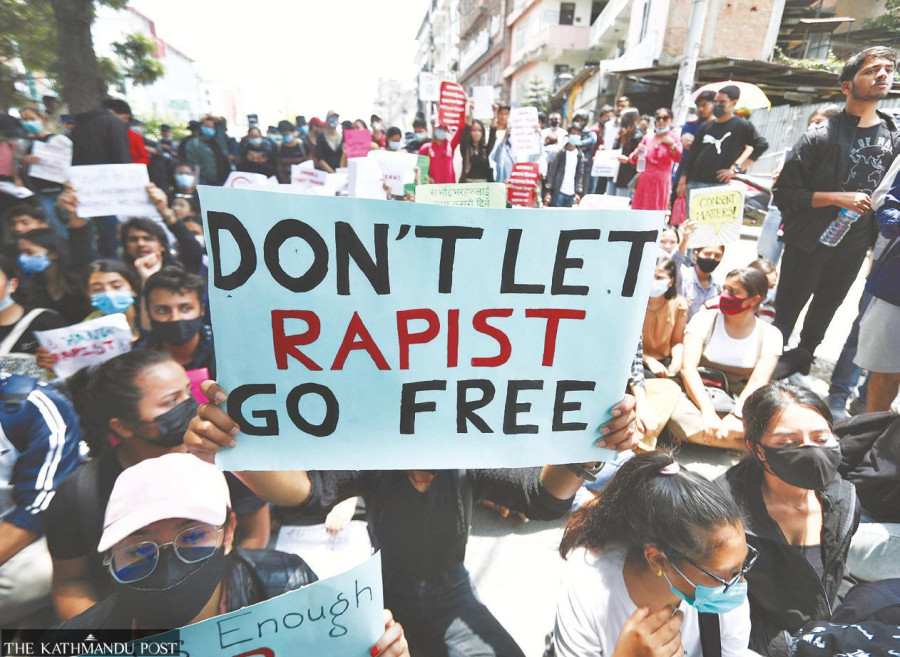National
Minors in no position to give consent to sex
Lowering the age of consent will leave children vulnerable to child sex abuse, grooming and sexual violence, experts say.
Aakriti Ghimire
In late February, a 17-year-old singer accused the actor Purna Bikram Shah, popularly known as Paul Shah, 32, of raping her with a false promise of marriage. Earlier this month, the district court in Nawalparasi (East) sentenced Shah to two years and six months in jail and slapped a fine of Rs25,000.
Shah wasn’t sentenced for rape but on the charge of molesting a minor.
The same day Shah’s sentencing was announced in Nawalparasi, a rape complaint was filed in Kathmandu against another popular figure, Sandeep Lamichhane, the 22-year-old captain of Nepal’s men national cricket team.
Like Shah, Lamichhane was accused by a girl aged 17, who is legally a child.
In the aftermath of the accusations, there were demonstrations in favour of the accused, with many arguing that the age of consent should be lowered.
Reducing the age of consent, however, will not lead to a reduction in cases of sexual violence, experts the Post spoke to said. It will only cut down on the number of reported crimes, leaving children more vulnerable to abuse while shielding perpetrators, they said.
“Men in power have mostly abused women and young girls. Lowering the age of consent will allow men easier access to minors and let them get away with it, upholding the status quo,” Pooja Pant, a women’s rights activist and media artist, said. “It will also set impossible standards for victims to access justice.”
The age of consent is the minimum legal age for young people’s capacity to make informed choices and participate in activities, including sexual behaviour.
According to the National Penal (Code) Act 2017, consent may be expressed verbally or in writing or by gesture or conduct. It states that the age of consent in Nepal is 18 years and consent given by a person under ‘a mistake of fact or fear or threat of any kind of injury or harm, or in a state of unsoundness of mind, or undue influence is invalid’.
While consent is often labelled a ‘tricky’ subject, experts argue otherwise. The narratives of consent as something ‘complicated’ are spread to uphold the unequal power dynamics in relationships and strip away partners’ sexual agency, they say.
“That consent is tricky is a garbage idea,” Sameera Singh, a sexual and mental well-being advocate, said. “There’s nothing hard about asking. People say it's a grey zone, that having a proper conversation while engaged in sexual activities is awkward. But that awkwardness or disruption prevents so much trauma and harm.”
Singh added, “Mostly men who spread these narratives of consent as a grey area keep the power dynamics in place by taking away women’s agency.”
Consent, according to experts, can be understood with the acronym FIRES—“Freely given, Informed, Reversible, Enthusiastic and Specific.”
There should be no factors influencing the decision an individual makes when it comes to consent—for example, the individual shouldn’t be under the influence of alcohol or feel pressured because the partner is rich, older or influential. The individuals should know what ‘touching’ means in the context—whether it’s touching of arms and shoulders or genitalia.
Consent is reversible and can be revoked at any instance, even if both partners are naked. In addition, consent should be enthusiastic—expressed along the lines of, “Yes, I want to have sex. I want to hold them. I want to do things.”
However, children cannot give consent freely because they are structurally disadvantaged within the social hierarchy. In an adult-child relationship, the unequal power structures coerce the children into engaging in sexual activity.
Children are instead vulnerable to various risks and harms, including abuse, grooming and sexual violence, where consent cannot be freely given, according to gender experts.
“The fact that an individual is a renowned figure already lays the foundation for sexual coercion. And when these men are older and privileged, there are unequal power dynamics, building up the subtle pressures against children and young girls—who can’t say ‘no’—to engage in sexual activity,” said Madhurima Bhadra, lecturer of gender studies at Tribhuvan University. “The consent then is never freely given, nor informed, specific, nor enthusiastic.”
The age of consent is thus codified to protect children with developing brains from making irrational decisions, according to gender experts.
Biologically, adolescents’ brains aren’t fully developed. The prefrontal cortex—a significant part of the brain in terms of social interactions which affects the regulation of emotions, controls impulsive behaviour, and assesses risk and long-term plans—develops until the late 20s.
“Young children are still developing to a certain point and they do not have the capacity to make decisions. They are rebellious and can make rash decisions without thinking of the consequences,” said Pant, the women’s rights activist who is the executive director of Voices of Women Media, a feminist media house.
According to WOREC (Women Rehabilitation Center), the majority of rape cases reported involve minors. In fiscal year 2020-21, about 45 percent of reported rape cases involved girls below 16, and 37 percent aged 17-25.
However, many rape cases of minors go unreported, because of various factors such as lack of awareness of what constitutes child sex abuse, fear of victim-blaming, inaccessibility of the justice system, and so on.
Additionally, the argument for lowering the age of consent completely negates the existence of marital rape or domestic violence, according to experts. To think that by reducing the age of consent, rape will not take place is a “deep-seated patriarchal and misogynistic mindset,” they say.
Experts say the burden of not engaging with a minor lies upon famous national figures like Shah and Lamichhane. They have the responsibility of knowing and acting according to the laws of the country they represent.
“Yes, the young girl might have wanted to be in a relationship with Paul Shah but as an adult, it doesn’t exempt Shah of his responsibility to be aware of the laws of the land,” says Bhadra, a public health practitioner with a focus on sexual and reproductive health.
“Even in Lamichhane’s case, he must at all times know and act in accordance with the law.”




 10.12°C Kathmandu
10.12°C Kathmandu















